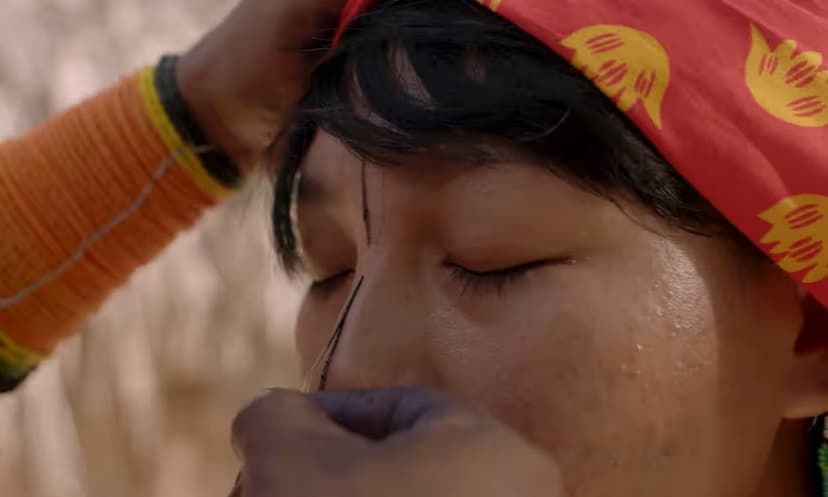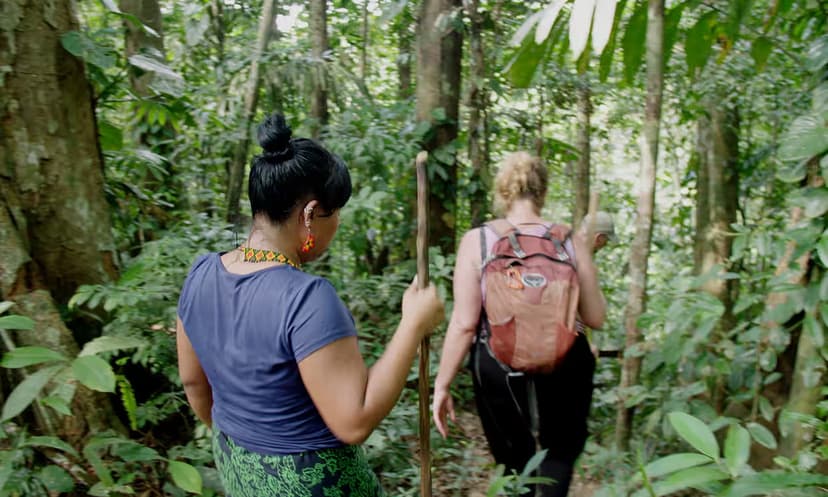THE ENDANGERED GENERATION?
‘A Film Like This Cannot Start With a Script'
10 October 2023
Written by
Monash University for The Guardian
In her new documentary, The Endangered Generation?, director Celeste Geer asks the hardest question of all: is humanity really doomed?
“A film like this cannot start with a script. It starts with a series of conversations and engagements with different people.”
When Walkley Award-winning director Celeste Geer was approached to work on the documentary The Endangered Generation?, the subject matter was already top of her mind. It was July 2021, and the world was in the grip of a future-shaping event.
“I had been spending the pandemic walking the streets of Melbourne, listening to podcasts,” she says. “I was thinking about all the different challenges that humanity is facing at the moment: gender, race, the environment, distribution of wealth, leadership, the rise of populism. These ideas were on my radar, and then this film came. It was just, wow, this is an incredible opportunity to explore all of these ideas.”
Geer is renowned for her passionate stories on social issues. She has previously directed Filthy Rich and Homeless for SBS, spotlighting life below the poverty line, and Then the Wind Changed, an exploration of disaster recovery after the 2009 Black Saturday bushfires.
With her experience, Geer was a logical fit for The Endangered Generation?. But the question this new documentary sought to answer was as big as they come: have we put future generations at risk of extinction?
It is a complex, multi-layered inquiry. Climate change is a significant factor, with catastrophic weather events endangering lives and livelihoods, but far from the only one. Intersecting with climate are issues of human rights, food scarcity, slavery, water usage, record levels of waste, geopolitical unrest, economic decline and mental health.

A woman from Panama (Nanulega Island) being marked with paint as part of a traditional custom.
With Monash University as a partner and supporter of the documentary, Geer had access to a vast pool of experts. Across many fields, from medicine to urbanisation, they agree that the coming years may create ideal conditions for the spread of disease and place a heavy burden on healthcare systems.
Geer’s role was to bring these many intersecting issues into one story, which took her on a seemingly infinite exploration of ideas.
“The challenge of the project is that the brief was very broad,” she says. “What we wanted to do was make a film about human collaboration, and about what humans are capable of when we break out of our siloed disciplines and actually collaborate.”
Of course, the pandemic made things exponentially more difficult. Geer paints a frustrating picture that reflects the reality of our time: a meta experience highlighting the very issues core to the documentary. “We would explore an idea, do a lot of research with leaders in a particular field, find out about a fascinating project, go and film it … and then the project itself would collapse. Or, we would find something we could actually do, and then somebody in the whole crew matrix would get Covid.
“We’ve had to be very fluid and very adaptive. It’s a parallel process to that we explore in the film.”
But while Covid was a challenge for production, it had also given the world cause to think about collective impact.
“There’s not a single person on the planet who hasn’t been touched by this,” Geer says. “Things that previously seemed like abstract ideas suddenly had real-world application.”

This new understanding opened the door for Geer to preach beyond the choir. Rather than lecturing the viewer, she has been able to build an experience in which they are viscerally immersed, emotionally engaged with a terrifying future reality.
It’s a tone that invites them to ask questions rather than telling them what to feel. As director, Geer has focused on giving viewers the chance to understand their own place in this vast story. She has built in characters and stories that give viewers a foothold, something to connect to.
That, she says, is the key to creating conversation and action. She hopes it will encourage viewers to think about the spaces in between – the interdependence of the issues. That this isn’t only climate change, but a whole raft of intersecting challenges that must be tackled to secure a future for the next generation.
“Time’s running out,” she says. “We need to be looking as broadly as possible for different approaches to this existential threat we find ourselves in. This film is designed to get us thinking a little bit more about us as a species, and about seeing ourselves at this critical moment now, but in a longer continuum of time.”
Ultimately, The Endangered Generation? is a documentary of questions. Why should we care about these issues, which can seem so far removed from us? What sort of world do we want to leave for our children? What can we do about it?
“It’s inspiring to see the characters in this film, who are all just like you, trying to really tackle something really big,” Geer says.
“They have days when they feel like we are going to get there on time, and other days when they don’t. But they just keep doing it because what’s the option? Are we just going to say, ‘It’s too late, we’re doomed?’ No, we’re not. We are going to look at what we can do.”
This article was originally published for The Guardian, 5 June 2023.